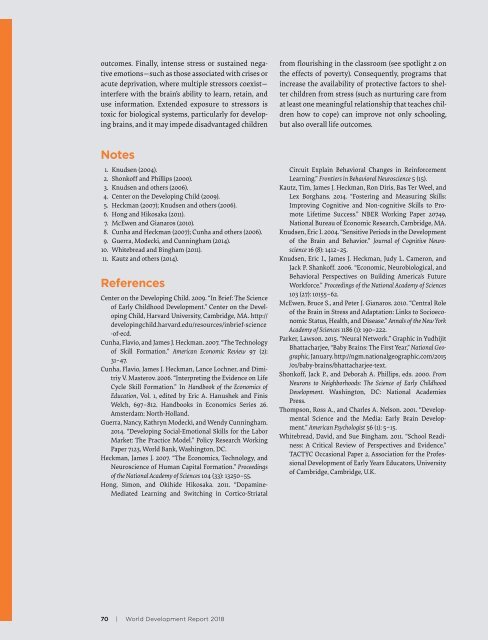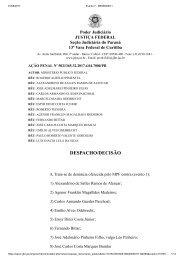Brasil só deve dominar Leitura em 260 anos, aponta estudo do Banco Mundial Relatorio Banco Mundial _Learning
You also want an ePaper? Increase the reach of your titles
YUMPU automatically turns print PDFs into web optimized ePapers that Google loves.
outcomes. Finally, intense stress or sustained negative<br />
<strong>em</strong>otions—such as those associated with crises or<br />
acute deprivation, where multiple stressors coexist—<br />
interfere with the brain’s ability to learn, retain, and<br />
use information. Extended exposure to stressors is<br />
toxic for biological syst<strong>em</strong>s, particularly for <strong>deve</strong>loping<br />
brains, and it may impede disadvantaged children<br />
from flourishing in the classroom (see spotlight 2 on<br />
the effects of poverty). Consequently, programs that<br />
increase the availability of protective factors to shelter<br />
children from stress (such as nurturing care from<br />
at least one meaningful relationship that teaches children<br />
how to cope) can improve not only schooling,<br />
but also overall life outcomes.<br />
Notes<br />
1. Knudsen (2004).<br />
2. Shonkoff and Phillips (2000).<br />
3. Knudsen and others (2006).<br />
4. Center on the Developing Child (2009).<br />
5. Heckman (2007); Knudsen and others (2006).<br />
6. Hong and Hikosaka (2011).<br />
7. McEwen and Gianaros (2010).<br />
8. Cunha and Heckman (2007); Cunha and others (2006).<br />
9. Guerra, Modecki, and Cunningham (2014).<br />
10. Whitebread and Bingham (2011).<br />
11. Kautz and others (2014).<br />
References<br />
Center on the Developing Child. 2009. “In Brief: The Science<br />
of Early Childhood Development.” Center on the Developing<br />
Child, Harvard University, Cambridge, MA. http://<br />
<strong>deve</strong>lopingchild.harvard.edu/resources/inbrief-science<br />
-of-ecd.<br />
Cunha, Flavio, and James J. Heckman. 2007. “The Technology<br />
of Skill Formation.” American Economic Review 97 (2):<br />
31–47.<br />
Cunha, Flavio, James J. Heckman, Lance Lochner, and Dimitriy<br />
V. Masterov. 2006. “Interpreting the Evidence on Life<br />
Cycle Skill Formation.” In Handbook of the Economics of<br />
Education, Vol. 1, edited by Eric A. Hanushek and Finis<br />
Welch, 697–812. Handbooks in Economics Series 26.<br />
Amsterdam: North-Holland.<br />
Guerra, Nancy, Kathryn Modecki, and Wendy Cunningham.<br />
2014. “Developing Social-Emotional Skills for the Labor<br />
Market: The Practice Model.” Policy Research Working<br />
Paper 7123, World Bank, Washington, DC.<br />
Heckman, James J. 2007. “The Economics, Technology, and<br />
Neuroscience of Human Capital Formation.” Proceedings<br />
of the National Acad<strong>em</strong>y of Sciences 104 (33): 13250–55.<br />
Hong, Simon, and Okihide Hikosaka. 2011. “Dopamine-<br />
Mediated <strong>Learning</strong> and Switching in Cortico-Striatal<br />
Circuit Explain Behavioral Changes in Reinforc<strong>em</strong>ent<br />
<strong>Learning</strong>.” Frontiers in Behavioral Neuroscience 5 (15).<br />
Kautz, Tim, James J. Heckman, Ron Diris, Bas Ter Weel, and<br />
Lex Borghans. 2014. “Fostering and Measuring Skills:<br />
Improving Cognitive and Non-cognitive Skills to Promote<br />
Lifetime Success.” NBER Working Paper 20749,<br />
National Bureau of Economic Research, Cambridge, MA.<br />
Knudsen, Eric I. 2004. “Sensitive Periods in the Development<br />
of the Brain and Behavior.” Journal of Cognitive Neuroscience<br />
16 (8): 1412–25.<br />
Knudsen, Eric I., James J. Heckman, Judy L. Cameron, and<br />
Jack P. Shankoff. 2006. “Economic, Neurobiological, and<br />
Behavioral Perspectives on Building America’s Future<br />
Workforce.” Proceedings of the National Acad<strong>em</strong>y of Sciences<br />
103 (27): 10155–62.<br />
McEwen, Bruce S., and Peter J. Gianaros. 2010. “Central Role<br />
of the Brain in Stress and Adaptation: Links to Socioeconomic<br />
Status, Health, and Disease.” Annals of the New York<br />
Acad<strong>em</strong>y of Sciences 1186 (1): 190–222.<br />
Parker, Lawson. 2015. “Neural Network.” Graphic in Yudhijit<br />
Bhattacharjee, “Baby Brains: The First Year,” National Geographic,<br />
January. http://ngm.nationalgeographic.com/2015<br />
/01/baby-brains/bhattacharjee-text.<br />
Shonkoff, Jack P., and Deborah A. Phillips, eds. 2000. From<br />
Neurons to Neighborhoods: The Science of Early Childhood<br />
Development. Washington, DC: National Acad<strong>em</strong>ies<br />
Press.<br />
Thompson, Ross A., and Charles A. Nelson. 2001. “Developmental<br />
Science and the Media: Early Brain Development.”<br />
American Psychologist 56 (1): 5–15.<br />
Whitebread, David, and Sue Bingham. 2011. “School Readiness:<br />
A Critical Review of Perspectives and Evidence.”<br />
TACTYC Occasional Paper 2, Association for the Professional<br />
Development of Early Years Educators, University<br />
of Cambridge, Cambridge, U.K.<br />
70 | World Development Report 2018








